|
|
|
Sort Order |
|
|
|
Items / Page
|
|
|
|
|
|
|
| Srl | Item |
| 1 |
ID:
181871
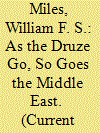

|
|
|
|
|
| Summary/Abstract |
The Druze, despite being a small minority faith group, have long survived in a challenging region, thanks in part to a doctrine of deference to whatever state they live in. In the past few years, however, the three largest Druze populations—in Israel, Lebanon, and Syria—have each faced some of their most difficult challenges yet, from a downgrading of their citizenship status to economic collapse and civil war. An increasingly active diaspora has emerged as an important advocate for Druze interests worldwide.
|
|
|
|
|
|
|
|
|
|
|
|
|
|
|
|
| 2 |
ID:
147882
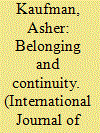

|
|
|
|
|
| Summary/Abstract |
This article analyzes spatial perceptions and practices of Druze citizens of Israel before, during, and after the Israeli occupation of South Lebanon in 1982−2000. It argues that the opening of the Israel–Lebanon border in 1982 and its closing in 2000 had three effects: it generated internal social, political, and cultural changes within the community in Israel; it changed the relationship of the Druze with the State of Israel; and it reestablished strong ties with their coreligionists in Lebanon and Syria. Drawing insight from the field of border studies, the article shows how Druze citizens of Israel live concomitantly in state and suprastate spatial scales, forming a third, integrated or hybrid, spatial scale. The article proposes using the concept “hybrid spatial scale” as a tool for studying communities such as the Druze that operate on multiple territorial scales.
|
|
|
|
|
|
|
|
|
|
|
|
|
|
|
|
| 3 |
ID:
180022
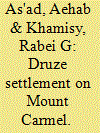

|
|
|
|
|
| Summary/Abstract |
The arrival date of the Druze at Mount Carmel is still unclear and several claims exist regarding it. None of the Druze villages have been extensively studied, and at present there are only two villages that survived the dismantling of the last two centuries; these are Daliyat al-Karmil and ʿIsifya. The current study will focus on Daliyat al-Karmil as a case study, using geographical, historical and archaeological evidence for dating the Druze arrival at Mount Carmel. The main claim suggests that the town began its journey during the early seventeenth century under the rule of Emir Fakhr al-Din al-Maʿani II; and another claim suggests that the town was built after the rule of Fakhr al-Din II, mostly because of immigration from Lebanon and Syria, as a result of the battle of ʿAyn Dara in 1711. Combining historical, archaeological and geographical evidence has led the present study to suggest that the settling of the town of Daliyat al-Karmil, as well as the other Druze settlements on Mount Carmel, did not begin before the seventeenth century. Moreover, it adds that the Druze inhabitation at Daliyat al-Karmil was among the earliest in the Carmel, and it probably began between 1622 and 1635.
|
|
|
|
|
|
|
|
|
|
|
|
|
|
|
|
| 4 |
ID:
162419
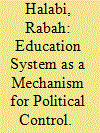

|
|
|
|
|
| Summary/Abstract |
In 1976, the educational system serving Druze villages in Israel was separated from the overall Arab school system and a distinct educational system was set up for the Druze. This was done because the Druze serve in the army. The State believed it was necessary to prepare them for service and reduce inevitable dilemmas concerning their identification with the State, in general, and dilemmas concerning the service, in particular. This educational system was staffed mainly by Druze and featured an intensive, purposeful effort, both in terms of the formal curriculum and informal education, to create an Israeli-Druze consciousness among the students. This consciousness was meant to cause Druze youth to identify with the State and its symbols, and involved an emphasis on what the Druze and the Jews have in common along with what separates the Druze and other Arabs.
|
|
|
|
|
|
|
|
|
|
|
|
|
|
|
|
| 5 |
ID:
140117
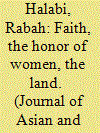

|
|
|
|
|
| Summary/Abstract |
This study investigates the status of the Druze women in Israel, focusing on the effects of the frequent interactions between the Druze and the more permissive Jewish-Western society. The main question posed is why Druze women accept the double standards of freedom, especially on sexual morality, that expect them to be chaste but allow sexual freedom to men. I argue that this is a patriarchal deal, in which women trade their sexual freedom in exchange for access to higher education, and to the prestigious status of moral guardians from western temptations. The paper is based on narrative analysis of in-depth interviews conducted with 50 Druze students, half of them male and half female, enrolled in Israeli universities.
|
|
|
|
|
|
|
|
|
|
|
|
|
|
|
|
| 6 |
ID:
147064
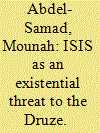

|
|
|
|
|
| Summary/Abstract |
Faced with an existential threat by the Islamic State of Iraq and Syria on one hand, and the repressive regime of Bashar Al-Assad on the other, the Druze community in Syria is faced with a dilemma of what political and military position to take. This study examines a variety of internal and external factors that affect the Druze's political and military choices in Syria, and finds that their best choice is to remain neutral in the conflict. I argue that any political and military choice by the Druze in Syria besides neutrality risks endangering the survival of the entire community. This article examines how internal organizational factors and the international community's divided position play important roles in understanding the Druze's decision to maintain a position of neutrality.
|
|
|
|
|
|
|
|
|
|
|
|
|
|
|
|
| 7 |
ID:
174160
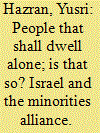

|
|
|
|
|
| Summary/Abstract |
The state of Israel, and the Zionist movement before it, has always considered itself to be facing an existential threat from hostile surroundings. Hence, seeking alliance with non-Arab nations and ethnic minority groups in the area was seen as a means of confronting this challenge. During the early decades of its existence, the Israeli establishment adopted the concept of the alliance of the periphery and the alliance of minorities developed by Israel’s first prime minister, David Ben-Gurion and his protégée, Reuven Shiloah, the founder of the Israeli intelligence service, the Mossad. This research project will demonstrate that, in opposition to apologetic and ideologically-motivated arguments that deny that alliance with minority communities has been a systematic policy, the minorities’ alliance has for decades been an important foundation of Israeli strategy vis-à-vis the Arab world. Furthermore, the article will argue and demonstrate that the ‘Minorities Alliance’ is derived from ideological, historical, and strategic considerations anchored in the very existence of Zionism and Israel. Furthermore, and on the same note, this conception and strategy cannot be disconnected from the self-perception of Zionism, its self-directed reading of Jewish history, and the Zionisation of the milieu.
|
|
|
|
|
|
|
|
|
|
|
|
|
|
|
|
| 8 |
ID:
126017
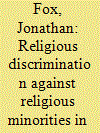

|
|
|
|
|
| Publication |
2013.
|
| Summary/Abstract |
This study examines religious discrimination between 1990 and 2008 against 47 religious minorities in 17 Middle Eastern Muslim majority states using data from the Religion and State-Minorities data-set. The study uses a 29-category variable which measures restrictions on the religious practices or institutions of minority religions which are not placed on the majority religion. Forty-five of the 47 minorities, including all non-Muslim minorities, experience religious discrimination. Discrimination is lowest but still substantial against Muslim minorities (e.g. Shi'i Muslims in a Sunni Muslim state), higher against Christians, but highest against Hindus, Buddhists, Druze, and Bahai. Twenty-eight of the 29 types of religious discrimination included in the data-set are present in the region. Finally, when discounting the removal of Saddam Hussein's regime from Iraq, religious discrimination in the region remains stable.
|
|
|
|
|
|
|
|
|
|
|
|
|
|
|
|
| 9 |
ID:
161901
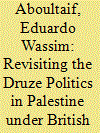

|
|
|
|
|
| Summary/Abstract |
There is an established literature which argues that the Druze of Palestine were either neutral during the Colonial period or supportive of the Zionist Agency and its plans. The aim of this research is to counter the Zionist narratives that promote the concept of Druze–Zionist cooperation. I argue that the Druze were supportive of the Palestinian-Arab cause, and they heavily participated in the anti-colonial activities of the Palestinians, politically and militarily. Their military participation was manifested in their participation in the events of 1929, 1936, and 1948. Politically, Sheikh Amin Tarif led the community in their stance against Zionism. This research will provide a new account and narrative for the Druze role in the events in mandatory Palestine, revealing their supportive stance to the Palestinian national struggle.
|
|
|
|
|
|
|
|
|
|
|
|
|
|
|
|
| 10 |
ID:
121493
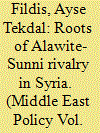

|
|
|
| 11 |
ID:
170715
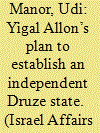

|
|
|
|
|
| Summary/Abstract |
Yigal Allon is largely known in the historiography of the Arab-Israeli conflict for the Allon Plan of the late 1960s, which sought to facilitate Israeli-Jordanian-Palestinian peace through the return of most of the West Bank to Jordan while retaining some parts, vital for Israel’s security, in line with UN Resolution 242 of November 1967. What is less known, however, is his attempt in the wake of the June 1967 war to bring about the creation of an independent Druze state in Jabel Druze, in southern Syria. This article sheds light on this overlooked episode – its underlying rationale and causes of failure.
|
|
|
|
|
|
|
|
|
|
|
|
|
|
|
|
|
|
|
|
|